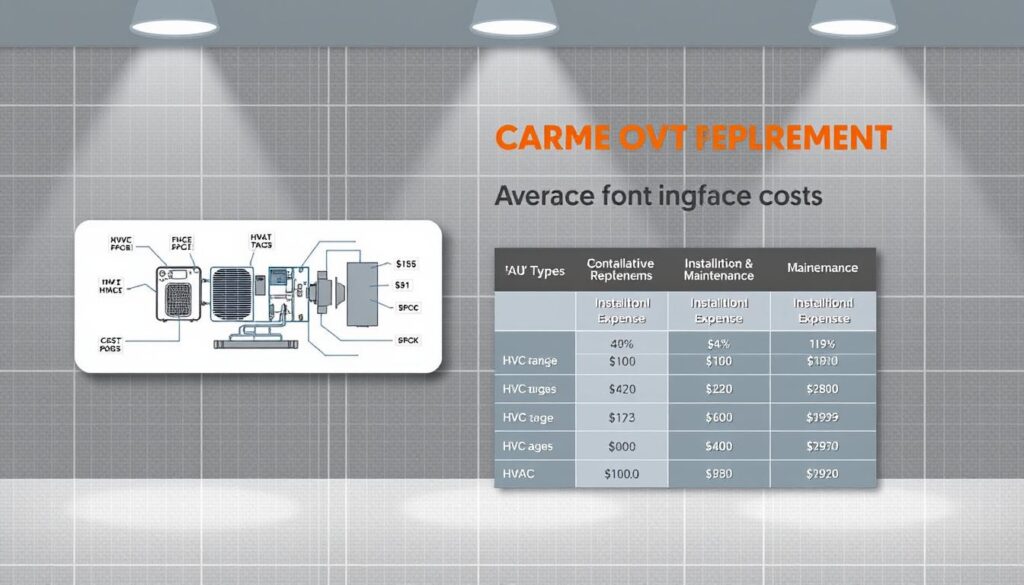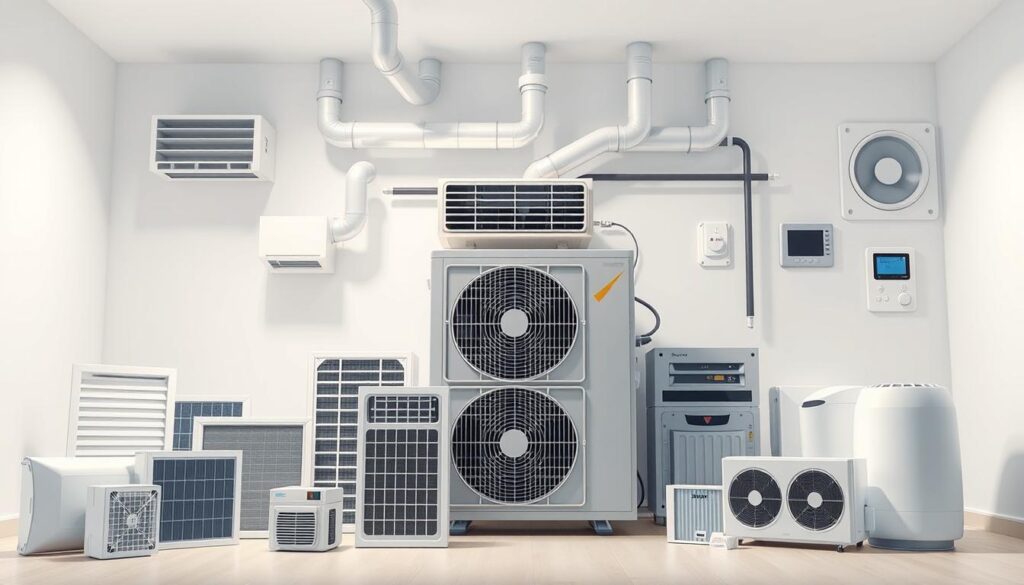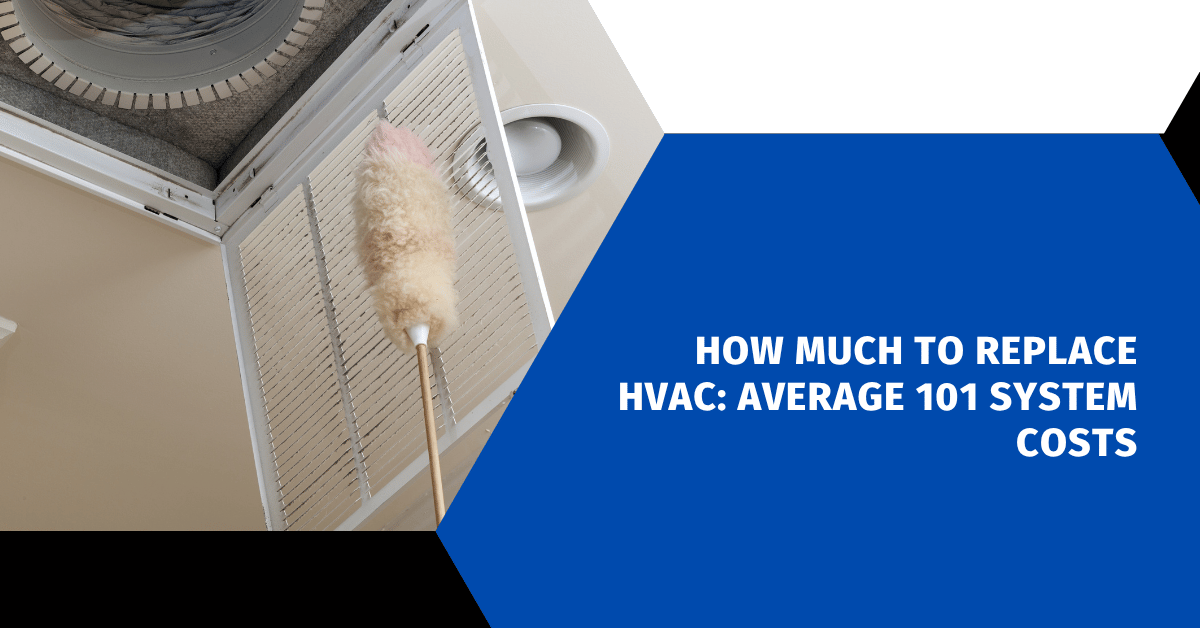Affiliate Disclosure
HVAC Guide Guys is a participant in the Amazon Services LLC Associates Program, an affiliate advertising program designed to provide a means for sites to earn advertising fees by advertising and linking to Amazon.
How Much to Replace HVAC? Are you curious about the cost to upgrade your home’s comfort system? Figuring out HVAC replacement costs can seem daunting. It’s like trying to solve a puzzle with many pieces.

Getting a new HVAC system is a big deal for homeowners. The cost can vary from $5,000 to $12,500. This depends on several important factors. Your home’s size, ductwork, energy needs, and the system you pick all matter.
When thinking about replacing your HVAC, consider a few key things. Your home’s size, ductwork, energy efficiency, and how easy it is to install all affect the price. These factors help determine the final cost.
Key Takeaways
- Average HVAC replacement costs range from $5,000 to $12,500
- Home size and layout significantly impact installation expenses
- Energy efficiency can influence long-term system costs
- Ductwork condition affects overall replacement price
- Professional assessment is key for accurate pricing
Table of Contents
Understanding HVAC System Replacement Basics
Your home’s comfort depends on a good HVAC system. Knowing about hvac system replacement helps keep your home comfy and efficient. Let’s explore why these systems are key for your home.
What is an HVAC System?
An HVAC system is your home’s climate control center. It stands for Heating, Ventilation, and Air Conditioning. It controls temperature, humidity, and air quality. Think of it as your home’s climate manager, working hard to keep you comfy all year.
- Heating parts warm your home in cold months
- Cooling systems cool your home in hot summers
- Ventilation brings in fresh, clean air
Average Lifespan of HVAC Systems
Knowing when to get a new hvac is key for home comfort. Most HVAC systems have a lifespan that homeowners should know.
| HVAC System Type | Average Lifespan |
|---|---|
| Central Air Conditioners | 10-15 years |
| Heat Pumps | 10-15 years |
| Furnaces | 15-20 years |
Signs You Need a Replacement
Don’t wait for your HVAC to fail. Watch for these signs that mean it’s time for a new one:
- Frequent and costly repairs
- Inconsistent temperatures in your home
- Unexplained high energy bills
- Strange noises or smells
“An ounce of prevention is worth a pound of cure” – this is true for your home’s HVAC system.
Spotting these signs early saves money and prevents breakdowns. Being proactive with new hvac installation keeps your home comfy and energy-smart.
Explore Our HVAC Shop
Looking for top-rated HVAC tools, parts, and accessories? Visit our shop and find the perfect solution for your needs.
Visit the ShopHow Much to Replace HVAC: Current Market Costs
Knowing the current costs for HVAC replacement is key to planning your home upgrade. In 2025, expect to spend between $5,000 and $11,000 for a new HVAC system.
The cost of replacing your HVAC depends on several factors. A basic replacement includes:
- Removing the old HVAC equipment
- Installing new heating and cooling units
- Connecting to standard ductwork
When looking at the cost of upgrading your HVAC, remember that complications can add to the price. Homes needing big ductwork changes might cost $7,000-$16,000. The final cost depends on your home’s size, system complexity, and installation needs.
Important costs to consider are:
- Home square footage
- Ductwork condition
- Energy efficiency ratings
- Local labor rates
Pro tip: Always get multiple quotes from certified HVAC professionals to ensure you’re getting the best value for your investment.
Your total HVAC replacement cost will depend on your home’s needs and the equipment quality. Planning ahead and knowing these costs can help you make a smart choice for your home’s comfort system.
Explore Our HVAC Shop
Looking for top-rated HVAC tools, parts, and accessories? Visit our shop and find the perfect solution for your needs.
Visit the ShopTypes of HVAC Systems and Their Costs
When you think about replacing your HVAC unit, knowing the different types is key. Each has its own benefits and prices. This helps match your home’s needs and your budget.
Choosing the right HVAC system means looking at your home’s size, climate, and needs. Let’s dive into the common types and their costs.
Air Conditioning Units
Air conditioning units are vital for your home’s comfort. Their prices vary a lot:
- Central air conditioning: $1,900 – $5,500
- Window units: $150 – $750
- Portable air conditioners: $250 – $700
Furnace Systems
Furnace systems are key for heating your home. Prices depend on the fuel type and efficiency:
| Furnace Type | Cost Range | Efficiency Rating |
|---|---|---|
| Gas Furnace | $2,300 – $6,500 | 80-98% AFUE |
| Electric Furnace | $1,600 – $4,500 | 95-100% AFUE |
| Oil Furnace | $4,500 – $10,000 | 80-90% AFUE |
Heat Pump Options
Heat pumps are great for both heating and cooling. Their prices vary a lot:
- Mini-split heat pump: $1,300 – $8,000
- Ground-source heat pump: $10,000 – $40,000
- Air-source heat pump: $4,000 – $15,000
Choosing the right HVAC system depends on your home’s needs, climate, and budget. Talking to a professional can help you find the best option for your home.
Factors Affecting HVAC Installation Costs
Knowing what affects your hvac replacement estimate can help you prepare for the ac replacement cost. Several key elements determine the overall expense of installing a new HVAC system in your home.
- Home Size and Layout: Larger homes need more powerful systems, which increases your HVAC installation costs. The size of your living space is key in choosing the right system capacity.
- Existing Ductwork Condition: The state of your current ductwork can greatly affect your hvac replacement estimate. Homes with damaged or inefficient ductwork may need a full replacement, adding thousands to the total cost.
- System Complexity: Different HVAC system types have different prices. High-efficiency models or specialized units will increase your ac replacement cost.
Your home’s unique characteristics can greatly impact installation expenses. Climate zone, insulation quality, and local energy prices all play a role in the final cost. Older homes might need extra work to fit modern HVAC systems.
“Every home is unique, and so is its HVAC replacement cost.” – HVAC Industry Expert
Key factors that influence your overall expenses include:
- System efficiency rating
- Brand selection
- Local labor rates
- Specific home requirements
To get the most accurate hvac replacement estimate, consider scheduling a professional assessment. Experts can give a detailed breakdown of costs specific to your home’s needs.
HVAC System Brands and Price Ranges
When you’re looking to install a new HVAC system, knowing the different brands and their prices is key. Not every HVAC system is the same. The brand you pick can really affect how much you’ll spend.
There are budget-friendly brands that offer reliable systems at lower costs. On the other hand, premium brands come with advanced features and longer warranties. Let’s take a closer look at the main players in the HVAC market:
- Budget Brands (Goodman, Payne)
- Lower initial costs
- Basic functionality
- Shorter warranty periods
- Mid-Range Brands (Carrier, Lennox)
- Balanced performance and price
- Better energy efficiency
- Moderate warranty coverage
- Premium Brands (Trane, Rheem)
- Higher upfront investment
- Advanced technology
- Extended warranties
- Superior energy efficiency
Your choice should match your budget, home size, and comfort needs. While premium brands might seem pricier at first, they often save you money in the long run. They offer better performance and need less maintenance.
Pro tip: Always compare warranty terms and energy efficiency ratings alongside the initial price when selecting an HVAC system.
Explore Our HVAC Shop
Looking for top-rated HVAC tools, parts, and accessories? Visit our shop and find the perfect solution for your needs.
Visit the ShopAdditional Components and Their Costs
When you think about replacing your HVAC unit, consider extra parts to boost your system’s performance. These add-ons can make your home more comfortable and might even save you money in the long run.

Upgrading your HVAC system is more than just a new unit. Today’s homeowners have many advanced options to control their home’s climate and air quality:
Air Purifiers and Filters
Keeping your indoor air clean is key for your family’s health. Air purifiers range from budget-friendly to high-end:
- Portable air purifiers: $100 – $500
- Whole-house air filtration systems: $500 – $4,000
- HEPA filter replacements: $50 – $200 annually
Smart Thermostats
Smart thermostats can help you cut down on energy costs. Here are some options:
- Basic smart thermostats: $120 – $250
- Advanced learning thermostats: $200 – $500
- Professional installation: $100 – $300
Dehumidifiers and UV Lamps
Dehumidifiers and UV lamps can also protect your HVAC system and improve air quality:
- Whole-house dehumidifiers: $1,300 – $2,800
- HVAC UV lamp systems: $500 – $1,500
- Annual maintenance costs: $100 – $300
Adding these components can make your HVAC system more efficient and your air cleaner. They might cost more upfront, but they can save you money and make your home more comfortable in the long run.
Installation and Labor Costs
When you plan to replace your HVAC system, labor costs are a big part of your budget. The complexity of the installation affects your total cost. Prices vary based on several important factors.
Getting a professional to install your new HVAC system is key. They make sure it works well and safely. They also consider your home’s specific needs to get the best performance.
- Labor costs usually range from $500 to $2,500
- More complex installations can cost more
- Changes to ductwork can also increase costs
There are many things to think about when replacing your HVAC system. These things affect how much you’ll pay for labor:
| Installation Factor | Potential Cost Impact |
|---|---|
| Home Square Footage | Directly affects installation time and complexity |
| Existing Ductwork Condition | May require additional modifications |
| System Accessibility | Challenging locations increase labor hours |
Pro tip: Always get multiple quotes from certified HVAC professionals to ensure competitive pricing and quality installation.
Where you live also affects labor costs. Cities usually have higher prices than rural areas. Even though professional installation might seem pricey, it saves money in the long run. It ensures your system works at its best.
Explore Our HVAC Shop
Looking for top-rated HVAC tools, parts, and accessories? Visit our shop and find the perfect solution for your needs.
Visit the ShopFinancing Options for HVAC Replacement
Managing the cost of replacing your HVAC system can be tough. Luckily, there are many financing options. They help spread out the cost of upgrading your HVAC system, making it more affordable.

When you’re thinking about replacing your HVAC system, look at different financial paths. Each option has its own benefits. They can help you manage the cost of making your home more comfortable and efficient.
Home Equity Loans
Home equity loans are a smart choice for big HVAC replacement costs. They let you borrow against your home’s equity. This usually means:
- Lower interest rates than personal loans
- Potential tax deductions
- Longer repayment terms
- Access to bigger loan amounts
Personal Loans
Need quick money for your HVAC upgrade? Personal loans are a great option. They offer:
- A faster approval process
- No need for home equity
- Flexible repayment plans
- Unsecured borrowing
Manufacturer Financing
Many HVAC manufacturers have special financing programs. These make replacing your system easier. They often include:
- Promotional zero-interest periods
- Flexible payment plans
- Direct partnership with installation companies
- Potential special discounts
Compare these financing options to find the best fit for your situation and HVAC needs.
Conclusion
Figuring out when to replace your HVAC system is important. It affects your home’s comfort and energy use. ENERGY STAR suggests checking your furnace every 10 to 15 years for best performance.
When you’re thinking about upgrading your HVAC, look beyond the cost. Think about your home’s needs, the local weather, and how it might save you money. New systems are more efficient, which means lower bills and better comfort.
Choosing the right time to replace your HVAC depends on your budget and home size. Look into different brands and compare prices. This way, you can make a smart choice that saves you money in the long run.
Getting advice from a pro is essential. Talk to certified HVAC experts who can give you advice that fits your home. A good plan for replacing your furnace can make your home more energy-efficient and cozy.

